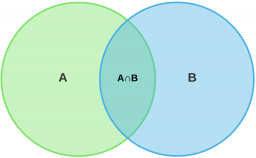All multiples
Set A is a set of all multiples of 2, and set B is a set of all multiples of 3. If the P (A)=0.6 and P (B)=0.3. Find P (AUB).
Final Answer:

Tips for related online calculators
Would you like to compute the count of combinations?
You need to know the following knowledge to solve this word math problem:
combinatoricsalgebrathemes, topicsGrade of the word problem
Related math problems and questions:
- AND-NOT-AND
 If P is the set of multiples of 2, Q is the set of multiples of 3, and R is the set of multiples of 7, the following integers will be in P and Q but not in R: A=−54 B=−50 C=42 D=100 E=252
If P is the set of multiples of 2, Q is the set of multiples of 3, and R is the set of multiples of 7, the following integers will be in P and Q but not in R: A=−54 B=−50 C=42 D=100 E=252 - Corresponding
 The set Z contains all natural numbers that are less than 11. Set A contains all even numbers belonging to the set Z. Set B is the set of all numbers that are multiples of 5 belonging to Z. Write all elements of the set Z in the corresponding dowry diagra
The set Z contains all natural numbers that are less than 11. Set A contains all even numbers belonging to the set Z. Set B is the set of all numbers that are multiples of 5 belonging to Z. Write all elements of the set Z in the corresponding dowry diagra - Intersect and conjuction
 Let U={1,2,3,4,5,6} A={1,3,5} B={2,4,6} C={3,6} Find the following. 1. )AUB 2. )A'UB'
Let U={1,2,3,4,5,6} A={1,3,5} B={2,4,6} C={3,6} Find the following. 1. )AUB 2. )A'UB' - The product 18
 The product of two consecutive natural numbers which are multiples of 3 is equal to 810. Find the two numbers.
The product of two consecutive natural numbers which are multiples of 3 is equal to 810. Find the two numbers. - Multiples
 Find all multiples of 10 that are larger than 136 and smaller than 214.
Find all multiples of 10 that are larger than 136 and smaller than 214. - Multiples of eight
 Find the sum of the first 25 multiples of 8.
Find the sum of the first 25 multiples of 8. - Linear system
 Solve a set of two equations of two unknowns: 1.5x+1.2y=0.6 0.8x-0.2y=2
Solve a set of two equations of two unknowns: 1.5x+1.2y=0.6 0.8x-0.2y=2
